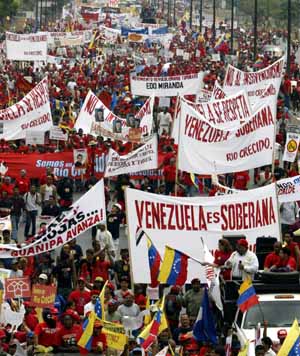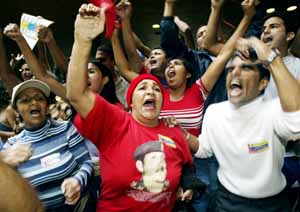|
New phone number for Militant
The new phone number for the Militant and Perspectiva Mundial is (212) 244-4899. The fax number is (212) 244-4947.
lead article
Pro-imperialist forces
set back in Venezuela
Elections board turns down recall referendum petition;
Washington intensifies offensive to topple Chávez gov’t


|
Reuters/Jorge Silva
|
Top: hundreds of thousands rally in Caracas February 29 to oppose U.S.-backed attempts to topple Chávez government. "Venezuela is sovereign," says banner. Bottom: pro-Chávez demonstrators in Caracas celebrate March 2 ruling by elections council.
|
BY ARGIRIS MALAPANIS
AND OLIVIA NELSON
The drive by weighty sectors of Venezuela’s capitalist class, with Washington’s full backing, to topple the government of President Hugo Chávez was pushed back March 2. The country’s National Electoral Council (CNE) announced that day that it had disqualified or set aside for further verification nearly half of the 3.4 million signatures the pro-imperialist opposition had submitted in December demanding a referendum to recall the president. That brought the total valid signatures to well below the 2.4 million required to trigger such a vote.
The U.S. government sided with the Coordinadora Democrática opposition coalition in charging that the election board’s ruling was undemocratic. “We are increasingly concerned about the situation in Venezuela,” White House spokesman Scott McClellan said March 2. “The United States continues to urge the Venezuelan National Electoral Council to finish its work in a timely and fully transparent manner. This is about allowing the people’s voice to be heard through the democratic process.” He added that “the focus should remain on the efforts by the Venezuelan people to exercise their constitutional and democratic rights [in] a transparent and internationally monitored presidential recall referendum.”
Representatives of the U.S.-based Carter Center and the Organization of American States, which have had “experts” in the country to monitor the recall campaign, said they saw no evidence of fraud in the CNE’s decision. In the same breath, however, they asked electoral authorities to disregard petition irregularities and respect “the apparent will of the voters,” according to the Washington Post.
Addressing hundreds of thousands who rallied in Caracas February 29 to oppose the U.S.-orchestrated campaign to topple the Venezuelan government, Chávez said the White House was responsible for destabilizing the country. He threatened to cut off oil shipments to the United States if Washington took further steps to intervene. Venezuela, the world’s fifth-largest oil producer, is among the top four suppliers of oil to the United States.
Venezuelan vice president José Vicente Rangel said the actions by Washington and its local backers amounted to a “third coup” against the government.
The escalating showdown between large sections of the working class and peasantry and some middle-class layers, on one hand, and the majority of the capitalist class, on the other, is the third major class confrontation in the country in the last two years. Two previous efforts to topple Chávez—a short-lived military coup in April 2002 and a bosses’ “strike” a year ago—were defeated as millions of working people mobilized in the streets, dividing the military.
After these two setbacks, the pro-imperialist opposition launched a petition drive demanding a referendum to recall the president, submitting 3.4 million signatures December 19.
The Chávez government charged that the signature gathering involved major fraud. Evidence presented by Caracas included testimony by workers who said their employers coerced them into signing the opposition petitions under the threat of losing their jobs; forged signatures of people who have died; and Venezuelans not listed on voter rolls crossing into the country from Colombia to back the anti-Chávez ballot drive.
As the February 29 deadline for a decision by the National Electoral Council neared, it became clear that the board would not grant the Coordinadora Democrática demand for a referendum.
Frustrated opposition resorts to violence
Frustrated that their plans to overthrow the bourgeois nationalist government would be thwarted once again, Fedecámaras, Venezuela’s main business association, and other groups in the opposition coalition organized daily antigovernment protests during the week leading up to the CNE announcement. Demonstrations ranged from tens of thousands to dozens of people. They became more and more concentrated in eastern Caracas, in the city’s wealthiest neighborhoods. Many of the protests included burning tires, blockading roads, and throwing tear gas at National Guard troops or pro-Chávez demonstrators.
The rightist protests intensified February 27 with a march in Venezuela’s capital during the two-day summit of governments of semicolonial nations known as the Group of 15. The U.S. big-business press reported that 30,000 took to the streets in the February 27 antigovernment protest. When demonstrators tried to advance to the summit venue, National Guard troops turned them back with tear gas. A firefight broke out, resulting in two people killed and 21 injured. Caracas fire chief Rodolfo Briceno said it was not clear who had used firearms.
A government statement blamed Bandera Roja (Red Flag), a Maoist group that has joined the pro-imperialist opposition coalition, and the social democratic Democratic Action party, which dominated the government for decades prior to Chávez’s election, for the violent confrontation. Chávez also accused the Caracas metropolitan police, which is under the control of the city’s mayor, opposition figure Alfredo Peńa, with aiding the outbreak of violence. He also threatened to use tanks, if needed, to bring the police under government control.
During this period, Chávez repeated statements that Washington was intervening openly to back the recall referendum drive and preparing to expand its offensive with possible open military intervention. He blasted the White House for attempting to tie his government to “terrorism,” through allegations of support for guerrilla groups in neighboring Colombia.
Washington denied that it was funding anti-Chávez groups. The government, however, presented unambiguous evidence that Sumate, a group that helped plan the recall drive, received $53,000 from the U.S. government through the National Endowment for Democracy (NED), which has funneled hundreds of thousands of dollars to groups trying to oust Chávez, according to the Washington Post.
“It was quite legitimate for them to receive funds from the NED, which gives money to hundreds of civil organizations around the world in order to promote democracy,” said Juán Fernández, a Coordinadora Democrática leader.
On March 2, CNE president Francisco Carrasquero announced that only 1.83 million signatures submitted by the opposition in December were valid. The elections board invalidated more than 600,000 signatures. It also ruled that another 870,000 could not be verified, calling on those who may have signed them to show up at designated polling stations between March 18 and March 22 to verify personally their signatures.
Officials of the pro-imperialist opposition said this would be a monumental task that could indefinitely postpone the referendum or derail it entirely. They were backed by officials of the OAS and the Carter Center.
In a sign of the growing tensions between the government and imperialist “experts” in the country, Carrasquero held a press conference March 1 stating that the Carter Center was leaving the country. Jennifer McCoy, the center’s president, replied, however, that her group had no plans to leave. “I want to make it clear that the Carter Center mission remains in Venezuela,” she told reporters.
Behind the intensifying class war
Elected in 1998, the Chávez government has won widespread popular support among workers, peasants, fishermen, and other exploited producers, as well as layers of small businessmen, for adopting measures that if implemented would be in the interests of working people. These include an agrarian reform law that grants the right to titles and credits to peasants who have taken over land on estates of big landowners and are tilling it; a bill that substantially expands the rights of small fishermen to the detriment of capitalist fishing firms; and legislation that strengthens control of oil and natural resources that are part of the country’s national patrimony.
Determined struggles by working people to implement such measures—including pitched battles between peasants and private armies of capitalist landowners—have been at the heart of why most in the capitalist class, with Washington’s backing, have not let up in their drive to topple the government.
Chávez has also drawn the ire of U.S. imperialism and its supporters in Venezuela for developing normal diplomatic and trade ties with revolutionary Cuba. These have included oil exports to Cuba on terms similar to those Caracas has extended to semicolonial countries in the region, cooperation in Venezuela’s nationwide literacy campaign launched in June 2003, and a program that has brought to Venezuela thousands of Cuban doctors operating free neighborhood clinics in areas where working people have had little or no access to health care. Some 15,000 Cuban volunteers now serve in Venezuela. These include doctors, literacy teachers, sports trainers, agricultural specialists, and others.
| 


